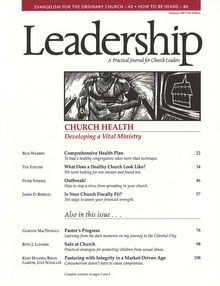Encouraging evangelism
Mitch McDonald, pastor of Foothills Baptist Church in Yuma, Arizona, is changing his perspective on evangelism:
“For a long time, we’ve believed the problem was ‘how-to.’ After several years of teaching people how to share their faith, we’ve come to realize that the main problem is ‘want-to.’ Now our focus is more motivational. As members hear testimonies from people whose lives have been changed, they’ve begun sharing their faith—in some cases, without having the formal training we still offer.”
Massive soul search
In NetFax, Leonard Sweet comments that in America, “there is a massive soul search going on.”
Sweet writes, “People are seeking experiences, not meaning and purpose so much, but experiences of transcendence, of soul … God is hot everywhere … not Jesus, but God.” (For a complete copy, call Leadership Network at 1-800-765-5323.)
Reconciliation resources
Through Promise Keepers and other groups, pastors have increasingly become interested in racial reconciliation. But it’s hard to find Christian, street-smart help with reconciliation’s gritty issues. One strong source is Reconcilers Fellowship, which sponsors a magazine, website, fax service, and conferences. Call 601-354-1563; write P.O. Box 32, Jackson, MS 39205;
Power of the ordinary
In his essay The Twelve Men, dealing with the British jury system, G.K. Chesterton wrote, “Whenever our civilization wants a library to be catalogued, or a solar system discovered, or any other trifle of this kind, it uses up its specialists. But when it wishes anything done which is really serious, it collects twelve of the ordinary men standing around. The same thing was done, if I remember right, by the Founder of Christianity.”
It puts a new spin on the much-maligned committee.
E-mail no-nos
Contributing editor Bob Moeller alerted us to several e-mail addresses pastors should not have:
peoplepleaser@yes.com
churchsplit@conflict.com
itsajob@burned.out
hippastor@hatehymns.com.
Resident outsider
David Coffin, pastor of Trinity Lutheran Church in Malinta, Ohio, writes that as pastor of a small, established, rural church, “I am the resident outsider.” This is both painful and productive.
Painful: “This can have a lonely dimension to it … I sometimes envy the connectedness to the land that many families within my congregation cherish … “
Productive: “I am called to see a bigger picture whenever I preach, teach, do pastoral care, or interpret current or political events. I represent the ‘otherness’ of God, which has no vested interest or blood-related ties to the local happenings of the area.”
A Pastor’s Legacy
As this issue headed to print, we learned that Dr. Samuel DeWitt Proctor, one of America’s most respected preachers and educators, had suffered a fatal heart attack. Leadership had been arranging an interview with Proctor, who helped found the Peace Corps and was senior pastor of Abyssinian Baptist Church in Harlem from 1972 to 1989.
Proctor’s greatest influence, however, may have been as a teacher and leader at several universities and seminaries. A list of his students reads like “Who’s Who among African-American Churches.”
Dr. Gardner C. Taylor concluded Proctor’s funeral service by noting he died “with his sword unsheathed and his armor still in place,” and that “he went directly to see the King with the stain of battle still on his garments.”
1997 by the author or Christianity Today/Leadership Journal. For reprint information call 630-260-6200 or contact us.









